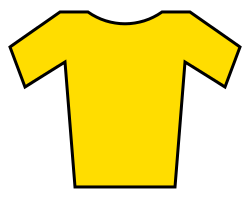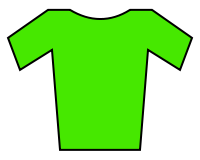André Darrigade
_(cropped).jpg) Darrigade at the 1956 Tour de France | ||||||||||||||||||||||
| Personal information | ||||||||||||||||||||||
|---|---|---|---|---|---|---|---|---|---|---|---|---|---|---|---|---|---|---|---|---|---|---|
| Full name | André Darrigade | |||||||||||||||||||||
| Nickname |
Le Lévrier des Landes Le Landais bondissant Dédé | |||||||||||||||||||||
| Born |
24 April 1929 Narrosse, France | |||||||||||||||||||||
| Team information | ||||||||||||||||||||||
| Current team | Retired | |||||||||||||||||||||
| Discipline | Road | |||||||||||||||||||||
| Role | Rider | |||||||||||||||||||||
| Rider type | Sprinter | |||||||||||||||||||||
| Professional team(s) | ||||||||||||||||||||||
| 1951-1955 | La Perle-Hutchinson | |||||||||||||||||||||
| 1955-1957 | Bianchi-Pirelli | |||||||||||||||||||||
| 1956-1957 | Helyett-Pottin | |||||||||||||||||||||
| 1958-1960 | Helyett-Leroux | |||||||||||||||||||||
| 1961 | Alcyon-Leroux | |||||||||||||||||||||
| 1962 | Gitane-Leroux-Dunlop | |||||||||||||||||||||
| 1963-1965 | Margnat-Paloma-Dunlop | |||||||||||||||||||||
| 1966 | Kamomé-Dilecta-Dunlop | |||||||||||||||||||||
| Major wins | ||||||||||||||||||||||
World Championship (1959) | ||||||||||||||||||||||
Medal record
| ||||||||||||||||||||||
André Darrigade (born Narrosse, 24 April 1929[1]) was a French professional road bicycle racer between 1951 and 1966.[1] Darrigade, a road sprinter won the 1959 World Championship and 22 stages of the Tour de France. Five of those were on the first day,[2] a record.[3]
Origins
André Darrigade was born at Narosse, near Dax in the forested Landes region. He came to attention at the other end of the country and on the track by beating the future world sprint champion, Antonio Maspes[4] in a meeting at the Vélodrome d'Hiver the night before the six-day race there.
His name immediately appealed to northern crowds. René de Latour said: "It is a very 'musical' name to [northern] French ears, especially when pronounced by a southerner who rolls his Rs like a Scotsman to make it sound like Darrrrrigade.[5] De Latour said:
- André Darrigade is heavily built and would have made a good football centre forward. He has blond hair, clear eyes, rosy cheeks, and is a bit on the shy side. When we first saw him in Paris soon after the war finished he was a novice, not a roadman at all. He had come to the big city to ride in the final of the famous Médaille race at the Vélodrome d'Hiver. When he arrived at the Vélodrome d'Hiver, he had no soigneur, no dressing gown,[6] nobody to hold him up at the start, pump his tyres or adjust his position to suit the high, frightening bankings. He was lonely — but courageous. And guess who was his principal victim — Antonio Maspes![5]
Darrigade stayed in Paris and joined one of its leading clubs, the Vélo-Club d'Asnières-Courbevoie, at the invitation of Francis Pélissier, the former professional who was one of its officials. Darrigade rode again on the track at the Vél' d'Hiv, winning madisons and sprints, and won four races on the road. He turned professional in 1951 for a salary that barely covered his rent
Professional career

Raphaël Géminiani said: "Darrigade was the greatest French sprinter of all time and he'll stay that way for a long time. The mould has been broken. But he wasn't just a sprinter. He was an animateur who could start decisive breaks; he destroyed the image of sprinters who just sit on wheels."[7] He began his sprints from a long distance from the line, challenging others to pass him. It endeared him to the French public, said de Latour.
Darrigade wore 16 yellow jerseys and 22 stages. He won the opening stage of the Tour de France in 1956, 1957, 1958, 1959 and 1961. Darrigade lost time in the mountains, however, and his best final positions were 16th in 1956, 1959 and 1960. In single-day races, he won the national championship in 1955 and a year and a half later the Giro di Lombardia. He won the world championship at Zandvoort on 16 August 1959, breaking clear with the Italian, Michele Gismondi, and an unknown Dane, Retvig. Darrigade was at his best in the middle of the season and the spring races were too early and those in autumn too late. He did, however, come fourth in the 1957 Paris–Roubaix, 3rd in Milan–San Remo and second in Paris–Brussels in 1960.
He said: "I was always considered a team man. I never had any pretensions to be anything else. In the days when the Tour had national teams, Marcel Bidot [the manager] always saw me as just that. Those wins never became dull or routine. Each one was an immense pleasure. What's more, I had the chance to race alongside such great champions as Louison Bobet and Jacques Anquetil." He was close to Anquetil, whom he called "bizarrely calm." He said: "Quite often, I had to say to him, 'If you don't get going, you'll lose the Tour."[3]
Parc des Princes crash
On 19 July 1958 the Tour finished at the Parc des Princes in western Paris. The 70-year-old sécrétaire-général[8] of the stadium, Constant Wouters[9] ran across the grass in the centre of the ground to prevent photographers encroaching on the track.[10] The journalists hid the riders and Wouters from each other and Darrigade rode into Wouters as he stepped onto the track. Darrigade was lifted from his bike and turned round and Wouters thrown into the air.[11] Both fell heavily and were taken to hospital.
Wouters was treated at the nearby Boucicaut medical centre but died on 31 July.[12] Darrigade cracked his skull and broke ribs.[3] He was able to return before the end of the meeting to take a lap of honour.[13][14][15]
Honours and personal life
Darrigade retired to run a newspaper shop in Biarritz. Finally retired, he became with his friend Albaladejo ardent fan of Biarritz Olympique, the town's rugby team, his first passion for the sport.
A stadium in Dax is named after him.[16]
Darrigade's brother, Roger, six years younger, also rode as a professional. In 1955, both brothers were French national champions, André in professional and Roger in amateur.
André Darrigade has two sons and two grandson.
He is an officer of the Légion d'Honneur.
Major results
1951
- Bordeaux-Saintes
1952
- 1st stage Paris-Saint Etienne
1953
1st stage 12
1954
- GP La Marseillaise
1955
-
 French Road National Champion
French Road National Champion - Tour de France
- 1st stage 6
1956
- Tour de France
- 1st stage 1
-
 Combativity award Overall
Combativity award Overall - Held Maillot Jaune
 during 6 stages
during 6 stages
- Giro di Lombardia
- Trofeo Baracchi with (Rolf Graf)
1957
- 3rd
 World Road Race Championships
World Road Race Championships - Tour de France
- 1st stages 1, 3a, 21 & 22
- Held Maillot Jaune
 during 1 stage
during 1 stage
- 4th Paris–Roubaix
- 3rd stage A Tour de Romandie
1958
- 3rd
 World Road Race Championships
World Road Race Championships - Tour de France
- 1st stages 1, 9, 15, 17 & 22
- Held Maillot Jaune
 during 5 stages
during 5 stages
- Paris-Valenciennes
- 1st stage Dunkirk Four-day
1959
- 1st
 World Road Race Championships
World Road Race Championships - Tour de France
- 1st
 Points classification
Points classification - 1st stages 1 & 11
- Held Maillot Jaune
 during 2 stages
during 2 stages
- 1st
1960
- 2nd
 World Road Race Championships
World Road Race Championships - Tour de France
- 1st stage 5
- 2nd stage Tour de Romandie
- 4th stage Tour de Romandie
- 15th stage Giro d'Italia
- 6th stage A Paris–Nice
1961
- Tour de France
- 1st
 Points classification
Points classification - 1st stages 1a, 2, 13 & 20
- Held Maillot Jaune
 during 1 stage
during 1 stage
- 1st
- 1st stage Dauphiné Libéré
- 2nd stage Paris–Nice
1962
- Tour de France
- 1st stage 2a
- Held Maillot Jaune
 during 4 stages
during 4 stages
- 3rd stage B Dauphiné Libéré
1963
- Tour de France
- 1st stage 12
- 6th stage B Paris–Nice
1964
- Tour de France
- 1st stages 2 & 18
- 8th stage B Dauphiné Libéré
- 9th stage B Dauphiné Libéré
- 5th stage Paris–Nice
See also
- List of French people
- UCI Road World Championships – Men's road race
- Grand Tour (cycling)
- Tour de France records and statistics
- Yellow jersey statistics
- List of Tour de France secondary classification winners
- Combativity award in the Tour de France
References
- 1 2 "Le Palmarès de André Darrigade". Velopalmares.free.fr. 1929-04-24. Archived from the original on 2012-02-19. Retrieved 2012-07-20.
- ↑
- 1 2 3 Vélo, France, undated cutting
- ↑ Chany, Pierre (1988), La Fabuleuse Histoire du Tour de France, La Martinière, France, p493
- 1 2 Sporting Cyclist, UK, undated cutting
- ↑ In that era riders wore dressing gowns (Am: robes), to keep warm between races
- ↑ Raphaël Raconte... Deleted personal web site retrieved 2003
- ↑ "Wouters is sometimes described as a gardener. His title was 'secretary-general' but he was more the track's caretaker and day-to-day manager". London: Guardian. 2 July 2007. Retrieved 2012-07-20.
- ↑ Born Deurne, Belgium, 26 October 1889. He lived in the 14th arrondissement of Paris.
- ↑ "Palmarès d'André Darrigade (Fra)". Memoire-du-cyclisme.net. 2010-11-21. Archived from the original on 2012-03-20. Retrieved 2012-07-20.
- ↑ Picture at:http://www.parismatch.com/parismatch/Dans-l-oeil-de-match/c-etait-dans-paris-match/Juillet-1958.-45e-Tour-de-France/(gid)/41601/%5B%5D
- ↑ He was buried in the suburb of Bagneux on 8 August.
- ↑ Chany, Pierre (1988), La Fabuleuse Histoire du Tour de France, La Martinière, France, p491
- ↑
- ↑ Picture of Darrigade in bandages: "Archived copy". Archived from the original on 2007-09-28. Retrieved 2007-04-06.
- ↑ "Archived copy" (PDF). Archived from the original (PDF) on 2008-11-14. Retrieved 2008-12-06.
External links
| Wikimedia Commons has media related to André Darrigade. |